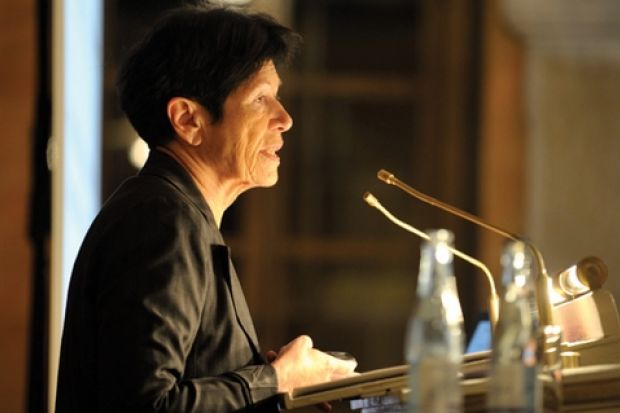The adoption of an impact agenda by the European Research Council would destroy the organisation and will never be countenanced, its president has pledged.
Helga Nowotny made the remarks at a high-profile conference in Brussels last week marking the fifth anniversary of the ERC's creation. It funds "frontier" - or blue-skies - research solely on the basis of scientific excellence.
Just over 20 per cent of its grants between 2007 and 2011 went to researchers at UK universities.
Professor Nowotny, emeritus professor of the social studies of science at ETH Zürich-Swiss Federal Institute of Technology Zürich, admitted that this approach created an "inherent tension" with "the demands of policymakers for practical innovation, seen as the undisputed motor of...economic growth".
Such tensions, she added, were heightened in tough economic times.
"One answer is to target resources...to look to strategic sectors, to put science to work on the most pressing problems. It all looks so easy, so obvious," she said. "But frontier science does not work like this. We cannot programme scientific breakthroughs or order them from a menu...We can't foresee the consequences of what we discover."
Many funding bodies around the world, including the UK research councils, require applicants to speculate on the impact of their proposals. Some even favour blue-skies research that promises to contribute to particular challenges.
But Professor Nowotny said the ERC's governing scientific council "would not yield" if it were pressured to adopt similar policies.
"It is very obvious that if we were to step back from the principle of excellence by only a tiny bit, it would be the end of the ERC," she said.
She added that politicians needed to trust "the cunning of reason" to find uses for apparently "useless" knowledge. Her position was backed by Morten Østergaard, Denmark's minister for science, innovation and higher education, who said he had not detected pressure for the ERC to adopt impact from fellow European science ministers.
Meanwhile, Máire Geoghegan-Quinn, European commissioner for research, innovation and science, dismissed suggestions from some European Union member states that the ERC should distribute its grants more widely. Introducing geographical criteria would diminish the global reputation that the ERC had gained for excellence, she said.
The European Commission has proposed a 77 per cent increase in the ERC's budget over the next seven-year spending cycle, known as Horizon 2020, taking it to more than €13 billion (£11 billion). Commission spending on science and innovation would rise by 45 per cent to €80 billion if its proposals are accepted by the European Parliament and the Council of Ministers.
Ms Geoghegan-Quinn described as "incontrovertible" the case for increased spending on research and innovation in order to boost EU competitiveness, jobs and growth.
She said that MEPs, who were also convinced by the argument, had a duty to help the commission make the case to governments so that research did not lose out due to its lack of lobbyists.
In a video message, European Commission president José Manuel Barroso said the ERC was a remarkable success story that had "spurred on healthy competition among top scientists at a European level".
Register to continue
Why register?
- Registration is free and only takes a moment
- Once registered, you can read 3 articles a month
- Sign up for our newsletter
Subscribe
Or subscribe for unlimited access to:
- Unlimited access to news, views, insights & reviews
- Digital editions
- Digital access to THE’s university and college rankings analysis
Already registered or a current subscriber? Login
